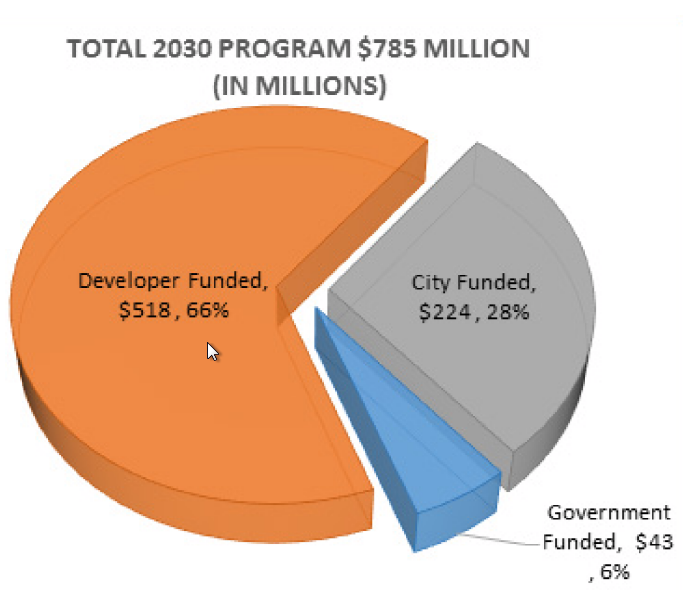Development fees & cost charges
We collect fees from land developers to offset costs of processing applications and finance capital projects related to new roads, drainage, sewers, water mains and acquiring parks. These fees include a Development Cost Charge (DCC), imposed by Bylaw pursuant to the Local Government Act. Anytime a proposed development increases density, DCCs are estimated and charged; this includes creating new square footage on a commercial or industrial project, adding new dwellings or creating new subdivided lots.
Development application fees and DCCs are important aspects of development within the City. They help offset some of the infrastructure expenditures experienced in servicing new developments and maintaining existing infrastructure.
We also offer developer incentives to promote specific types of development. This includes urban centre incentives and housing incentives.
With an anticipated population increase of 45,000 new residents by 2040, a revised series of DCCs is being proposed to ensure appropriate funding is in place for the required capital projects and future infrastructure needed to adequately service the needs of the community. The last DCC update was in 2019 and since then several changes have occurred. Read the DCC Update 2022 fact sheet to learn more.
DEVELOPMENT COST CHARGE BYLAW
Development application fees are required with any development application and are used to offset the cost of processing applications, advertising for public meetings and legal and administrative fees.
The City’s DCC Program is integrated with the City’s Official Community Plan, 20-year Servicing Plan and Financing Strategy, which details the major infrastructure improvements for water distribution, wastewater trunks and treatment, major roads and parkland acquisitions that will be required to accommodate the City’s projected growth.
The City’s DCC program contains the individual works, identified in the servicing plan, that are required to accommodate growth. The cost of each of the works is allocated in the program between growth and the existing population. The portion allocated to growth forms the basis of the DCC rates.
Infrastructure costs should be paid by those who will use and benefit from the installation of such systems. Recognizing that costs should be shared in some way amongst benefiting parties, DCC are a mechanism that distribute these costs between existing users and new development in a fair manner.
The City’s infrastructure servicing plan is funded as follows:

The DCC update is required to update estimated infrastructure construction and land costs so they reflect current market conditions. If the City’s DCC rates don’t reflect current market conditions, then DCC revenue won’t sufficiently fund the infrastructure improvements and the City would have to defer infrastructure improvements or fund from alternate sources (i.e. taxation or utility rates).
The Official Community Plan is a long-range planning document that helps to guide and shape the future of the City. It helps to outline which infrastructure project such as roads, parks and wastewater are needed.
It’s widely accepted that growth, when facilitated by good planning, benefits communities and their economies. Local governments have come to recognize, however, that the accommodation of growth is not a cost-free exercise. Growth creates demands for the construction of new infrastructure and the expansion of existing local services. The cost of meeting these demands is often substantial and, at times, beyond the ability of local governments to fund using existing financial resources.
DCCs are fees that municipalities collect from new development to help pay the cost of infrastructure services that are needed for growth.
Local governments are limited in the types of services they may fund using DCC revenues. Specifically, DCCs may be used to help offset costs associated with the provision, construction, alteration or expansion of:
- Roads, other than off-street parking
- Sewer trunks, treatment plants and related infrastructure
- Waterworks
- Drainage works
DCCs may also be collected to assist in the acquisition and development of parkland, but may not be used to pay for other types of services that are affected by growth, such as recreation, policing, fire and library.




